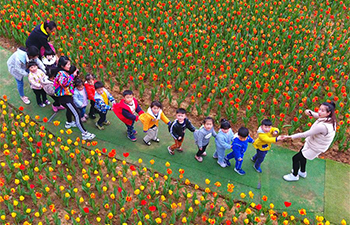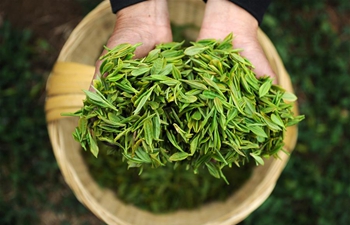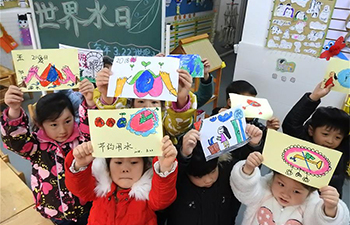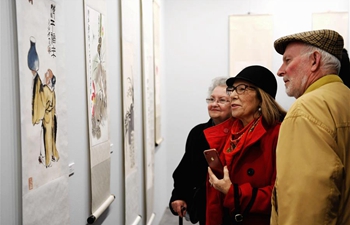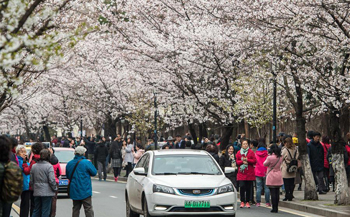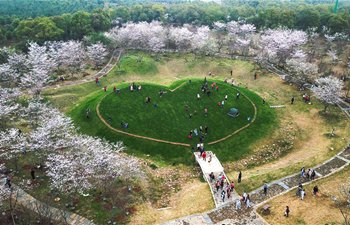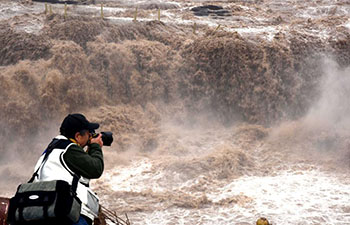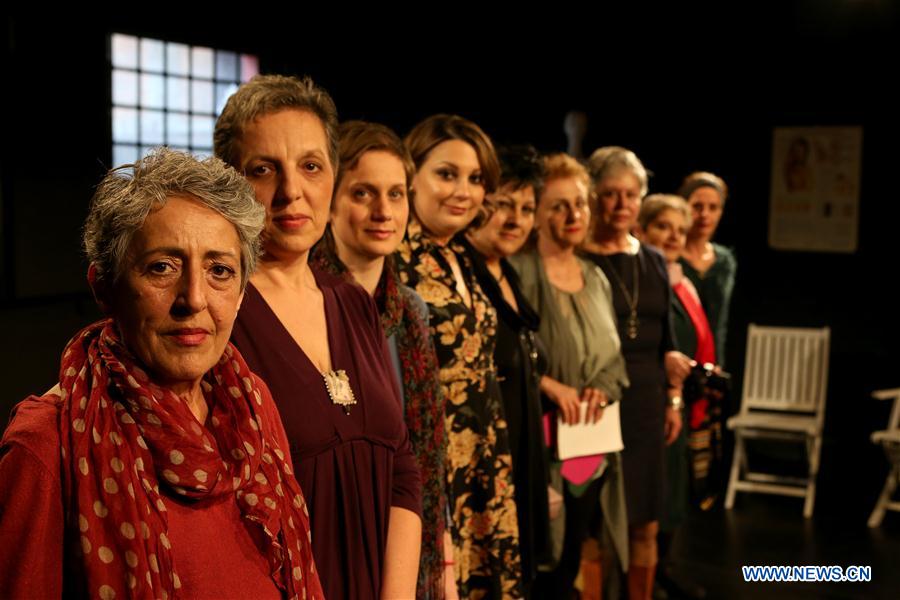
Cancer survivors pose for photos in a theatrical play in Athens, Greece, March 16, 2018. Nine female cancer survivors would tell on stage their story in a theatrical play staged in Athens this spring to raise awareness to the public. The theatrical play is part of the initiative held by the Center for Support, Education, and Research in Psychosocial Oncology of the Greek Cancer Society. (Xinhua/Marios Lolos)
by Alexia Vlachou
ATHENS, March 22 (Xinhua) -- Nine female cancer survivors would tell on stage their story in a theatrical play staged in Athens this spring to raise awareness to the public.
The performance aims to talk openly about the illness and the pain, but above all to transform through art their experience into something beautiful and creative to keep on.
"Within an hour one can see the whole dimension of cancer, how it affects the patient, the relatives. It educates the audience, but it helps the actresses who are the living heroes to overcome their problem," Evangelos Filopoulos, president of the Greek Cancer Society told Xinhua.
The theatrical play is part of the initiative held by the Center for Support, Education, and Research in Psychosocial Oncology of the Greek Cancer Society.
After a year of weekly meetings, interviews and improvisations, these nine women with the support of their clinical psychologist and scientific director of the Center Ioannis Dinos, and the guidance of Greek director Georgia Mavragani performed before an audience.
"The theatrical play is the climax of a whole journey that lasted one year through meetings of the director Georgia Mavragani with these women who learned to improvise, to play, to test their body, to trust each other," Dinos stressed.
Besides the psychological and social support, the idea was to help cancer survivors to pick up the thread of their life after having all the treatment procedures that helped them overcome the disease.
Mavragani decided to undertake the project as she was interested in approaching the disease on stage not with actors but with real cancer survivors.
"Cancer disease is something that happens in life, and I try to disconnect it from death," she said.
The Greek Cancer Society made an open call to women who had been through breast cancer and who might be interested in participating voluntarily in the project. Some responded directly; others went after their therapists suggested them.
It was not an easy journey.
During the meetings, the nine women had to recall their memories or bring objects linked to that period of their life to help them build their story in personal or group interviews.
"Sometimes it was like a burden, the memory, to go back and dive into that period. But, it was redemption as well," Mara Pavlopoulou told Xinhua.
Pavlopoulou was diagnosed with colorectal cancer in 2011, she was operated, and then three more surgeries followed in 2012 in the knee, in 2013 in the uterus and the last in thyroid in 2015.
"They were not all cancer. But when you start, whatever is suspicious you must get it out," she stressed.
For all the participants, the theatrical play is redeeming their lives.
"We were all together. It did not matter where you had cancer. We all had a common denominator, so we did not have to say much. If I cried, I would not have to apologize. We know why you cry, we know what you remember," she added.
"Even though we did not know each other, our common pain united us, because we had to go through the same things," Stella Hatzimichael said.
Through the play and the help of their director, the nine cancer survivors expressed their need to talk publicly about the disease.
"With my family, we did not talk about it. My siblings were very supportive, but they did not want to discuss it," Pavlopoulou said.
According to Dinos, cancer is still a taboo theme in Greece.
"It is difficult to overcome it since it is linked to death. Especially, in our times we avoid thinking about death, we want to think positive things," he explained.
The feeling of guilt is another factor that oppresses the patient. Mavragani tried to approach the play with that in mind.
Fotini Hapsa, another participant of the play agreed.
"We should not feel guilty for getting sick. The guilt of the disease is wrong. It is part of our life; we must continue. The illness is part of the life just like joy," she stressed.
Hapsa, an architect, joined the group after her therapist advised her to do so. At the beginning, she hesitated, but after the first meeting, she felt connected with the others.
"I could not imagine how our meetings could be transformed into a play. It's a difficult project to take nine different stories, connect them and have a nice artistic result. Very impressed with the result," she told Xinhua.
According to Pavlopoulou, most of the people who come to watch the play have experienced cancer or have members in their families who have been diagnosed with cancer.
"Art helps you communicate, and especially theatre. What you want more when you have a difficult time is to feel relieved to express your pain, your insecurities, but in the end to have hope for you and the audience," Hapsa said.
"We are very pleased to present a performance of artistic value that does not dive due to its subject to death and sadness. On the contrary, dives into life, into its difficulties, its strength and strong desire to continue," Mavragani said.
The next step for all the parts involved in the project, the patients, the doctors and the art community is to examine new similar projects to benefit more people in need, they said.




